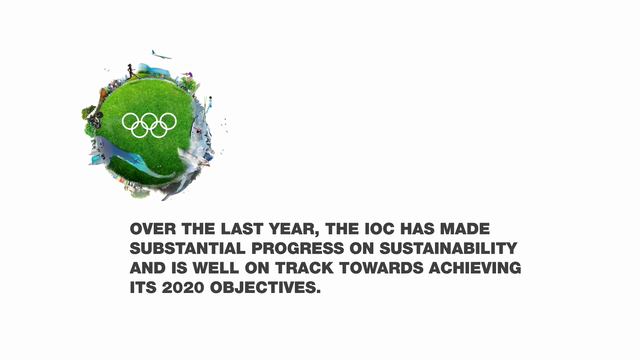Faster, Higher, “Greener”: IOC Shares Its Sustainability Progress
International Olympic Committee news
From the inauguration of Olympic House – one of the world’s most sustainable buildings – to the Olympic Games Tokyo 2020 sustainability initiatives and the launch of the UN Sports for Climate Action, the IOC Sustainability Progress Update highlights achievements against the IOC’s 2020 sustainability objectives. They cover the sustainability work of the IOC as an organisation, as the owner of the Olympic Games and as the leader of the Olympic Movement.
“We are proud of the significant progress we have made over the past 12 months,” said HSH Prince Albert II of Monaco, Chair of the IOC Sustainability and Legacy Commission. “The IOC will continue to lead the Olympic Movement and the wider sporting world in taking effective action on sustainability. In 2020 and beyond, we will continue harnessing the immense power of sport to build a better, fairer and more sustainable world.”
At the organisation level, in June 2018 the IOC inaugurated its new headquarters, Olympic House. The building was awarded three of the most rigorous sustainable building certifications, including the highest level of the international LEED green building certification. Olympic House received the most points (93) of any LEED v4-certified new construction project to date, becoming one of the most sustainable buildings in the world. In addition, it was awarded the Minergie P certification, the Swiss standard for energy-efficient buildings, and was the first international headquarters to be awarded the Platinum Swiss Sustainable Construction Standard (SNBS) certification.
Improved recycling and waste management, new water-saving and energy efficiency features all contributed towards reaching these sustainability standards. Olympic House is estimated to use 35 per cent less energy and 60 per cent less municipal water than a conventional new construction. The IOC also received eight zero-emission hydrogen fuel cell cars from Worldwide Olympic Partner Toyota. A hydrogen station was installed at Olympic House, distributing hydrogen sourced from renewable energy sources to supply the vehicles.
Thanks to its Official Carbon Partner Dow, the IOC’s estimated 2017-2020 residual carbon emissions have already been compensated. This has allowed the IOC to reach its “carbon neutrality” objective. The IOC-Dow global carbon mitigation programme goes far beyond balancing the IOC’s operational emissions; it will allow the IOC to deliver additional climate benefits from a portfolio of projects, enabled by Dow’s material science.
As the owner of the Olympic Games, the IOC has enhanced its cooperation with the Organising Committees for the Olympic Games (OCOGs) to help them incorporate sustainability in all aspects of the planning and staging of each Games.
As part of these efforts, the IOC created the “Carbon Footprint Methodology for the Olympic Games”, which helps OCOGs develop a carbon plan for the Olympic and Paralympic Games, enabling them to successfully measure and minimise their carbon footprint. Alongside this methodology, the “Olympic Games Guide on Sustainable Sourcing” explains the IOC’s sustainable sourcing requirements and supports OCOGs in meeting them. The introduction of this guide is an important step towards a consistent, sustainable approach to sourcing goods and services for the Games.
The IOC has also enhanced its collaboration with Olympic Games stakeholders. As a result, a series of innovative sustainability initiatives have been put in place by Worldwide Olympic Partners ahead of the Olympic Games Tokyo 2020. For example, P&G has launched a joint initiative with Tokyo 2020 to create the medal ceremony podiums out of plastic waste. The waste has been either donated by the public or recovered from oceans and waterways. After the Games, the podiums will be recycled back into packaging for P&G products. The uniforms of the Tokyo 2020 Olympic torchbearers are also being produced in part from recycled plastic bottles collected by Worldwide Olympic Partner Coca-Cola; while Toyota is providing zero-emission vehicles for the Games, including fuel cell electric vehicles.
A key achievement of the IOC as the leader of the Olympic Movement has been the launch of the UN Sports for Climate Action Framework. The framework, which was co-developed by the IOC in partnership with UN Climate Change, calls on the sports community to jointly develop a climate action agenda for sport. More than 80 sports organisations have joined the Framework since its launch. The first meeting of the signatories was hosted by the IOC in September 2018, laying the groundwork for the Framework’s implementation.
To further accelerate the Olympic Movement’s action on climate, the IOC and Dow launched a new carbon initiative this year. The initiative is designed to boost the Olympic Movement’s sustainability efforts by offering carbon offsets as a reward for tangible climate action. To qualify, International Sports Federations (IFs) and National Olympic Committees must have signed the Sports for Climate Action Framework and prove that they are actively reducing their greenhouse gas emissions. So far, 10 IFs have been rewarded for their carbon reduction measures, achieved through initiatives in both their operations and events.
In addition, the IOC has published new guides as part of its “Sustainability Essentials” series. “Sports for Climate Action” was published in collaboration with the United Nations Framework Convention on Climate Change (UNFCCC) to provide the Olympic Movement members with an understanding of climate change and how to reduce their carbon emissions. “Sustainable Sourcing in Sport” was created to help sports organisations adopt more sustainable sourcing practices.
The IOC has also been empowering athletes to leverage their reach and influence to advance global sustainability. This has included supporting Great Britain’s Rio 2016 sailing gold medallist Hannah Mills to launch “The Big Plastic Pledge” – a global campaign to unite athletes and fans around the issue of plastic pollution. Almost 200 elite athletes have signed the pledge so far.



